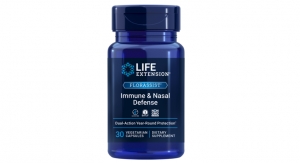08.26.14
New study results on Embria Health Sciences’ EpiCor ingredient have been published online in the Journal of Medicinal Food (Jensen, Gitte, S., et al., “Anti-Inflammatory Properties of a Dried Fermentate In Vitro and In Vivo”).
The article summarizes studies that provide additional understanding of EpiCor’s modes-of-action. The article combines results from a human clinical study together with in vitro results.
The in vitro results showed statistically significant reduction of free radical formation under oxidative stress when pretreated with an EpiCor solution. Additionally, pretreatment of PMN cells with EpiCor resulted in a reduction in migration toward the inflammatory chemokine LTB4 (also known as chemotaxis), which was also statistically significant over a wide dose range.
Stuart Reeves, PhD, co-author of the study and Director of Research and Development at Embria Health Sciences, stated for the in vivo part of the study that, "This human clinical trial can be thought of as a model using the outer epidermis (skin) to simulate how an oral dose of EpiCor might interact with the gut epithelium. The positive results are very promising, and complement the earlier published in vitro work showing gut health benefits".
Larry Robinson, co-author of the study and Vice President of Scientific Affairs, noted, “Investment in human clinical research is key to Embria’s leadership position. Through research Embria continues to identify EpiCor’s multiple modes-of-action, further differentiating EpiCor from other immune ingredients.”
For more information: http://www.embriahealth.com/epicor.asp.
The article summarizes studies that provide additional understanding of EpiCor’s modes-of-action. The article combines results from a human clinical study together with in vitro results.
The in vitro results showed statistically significant reduction of free radical formation under oxidative stress when pretreated with an EpiCor solution. Additionally, pretreatment of PMN cells with EpiCor resulted in a reduction in migration toward the inflammatory chemokine LTB4 (also known as chemotaxis), which was also statistically significant over a wide dose range.
Stuart Reeves, PhD, co-author of the study and Director of Research and Development at Embria Health Sciences, stated for the in vivo part of the study that, "This human clinical trial can be thought of as a model using the outer epidermis (skin) to simulate how an oral dose of EpiCor might interact with the gut epithelium. The positive results are very promising, and complement the earlier published in vitro work showing gut health benefits".
Larry Robinson, co-author of the study and Vice President of Scientific Affairs, noted, “Investment in human clinical research is key to Embria’s leadership position. Through research Embria continues to identify EpiCor’s multiple modes-of-action, further differentiating EpiCor from other immune ingredients.”
For more information: http://www.embriahealth.com/epicor.asp.



























